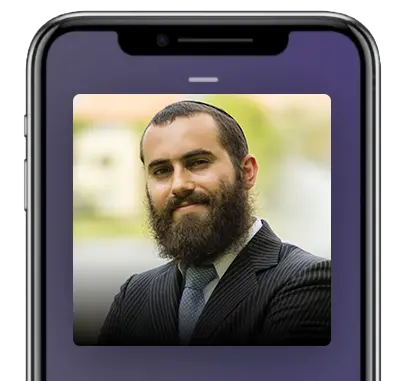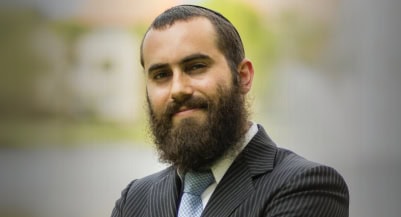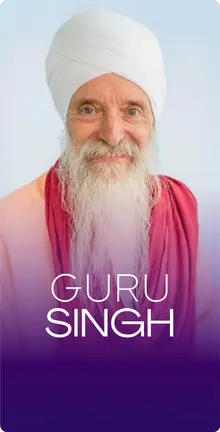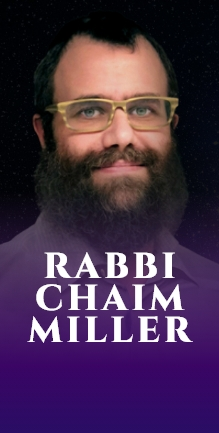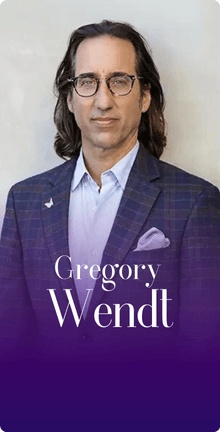In this Episode
- [02:21]Stephan welcomes Rabbi Pinchas Taylor, thanking him for his coaching and mentorship, leading to a discussion about Rabbi Pinchas’ journey to Judaism.
- [08:32]Stephan inquires about Rabbi Pinchas’ rise to prominence and his media appearances.
- [10:49]Rabbi Pinchas highlights that the path to forgiveness and reconciliation is universal and applicable to any situation, even those seemingly unrelated to spiritual teachings.
- [11:45]Stephan and Rabbi Pinchas explore the differences between the 10 Commandments and the Noahide laws.
- [18:26]Stephan questions about the oral Torah and its role in understanding the written Torah.
- [29:13]Stephan and Rabbi Pinchas delve into the spiritual significance of Hebrew letters and their role in creation.
- [41:32]Rabbi Pinchas elaborates on the significance of repentance (Teshuvah) and its power to erase past mistakes and their consequences.
- [48:54]Rabbi Pinchas clarifies that free will enables humans to make decisions based on their five senses and faith, without relying on divination or psychic abilities.
- [53:31]Rabbi Pinchas shares his final piece of wisdom.
Rabbi Pinchas, welcome to the show, and thank you for coming.
Thank you so much for having me. It’s great to be with you.
We met because I contacted you out of the blue, and we started meeting. I’ve gotten some really great coaching from you. Thank you for that. We’re like old friends now, not just meeting for the first time on this interview. So, thank you for taking the time to do this. I’d love to start this interview by asking what appealed to you about Judaism. We went from not being observant as teenagers to being observant, and there was a turning point for you. There was something that drew you in. So what was that?
Well, it does feel like we’re old friends, and I’m glad to be able to share this little bit of story with you. I can’t say that it was a particular moment, incident, meeting, or situation, which is usually what people think when it comes to this sort of thing. It was a little bit out of the blue, similar to how we met—just some kind of divine intervention. What happened was when I entered high school, and in ninth grade, there was a class where the presentation that we were supposed to give was “What do you want to be when you grow up?” and give a presentation based on sort of the pathway of how one would get to that place.
I never really thought about it in a serious way. I was just coming into high school, and when I thought about it, the direction that I was kind of led to was to become a rabbi. It kind of made sense to me. I always liked spirituality, Judaism in particular, but spirituality in general. I was like people. I was like teaching. I was like learning.

So, if you stir that in a pot, Rabbi seems like the ideal job that comes out of that. So, I decided I wanted to be a rabbi before deciding that I want to be observance. Then, the exploration of what different kinds of rabbis are out there led me more to observance. I had been in a Chabad Hebrew school when I was seven and had a bar mitzvah in a conservative temple. Those were the first two places I explored since I already had a familiarity and connection with them.
It didn’t take very long to decide on the Chabad route, because Chabad felt like a very strong connection with tradition, like they weren’t cutting any corners. They were living the Torah as the Torah was given, but also very engaged in the modern world. They weren’t cloistered off. They weren’t closed-minded towards other people who didn’t have that lifestyle. I found that very attractive. Then, the more I started reading the writings of the Rebbe that had been translated into English at the time, the more I just couldn’t get enough. It was like a kid in a candy store just finding the gold. That’s what brought me in that direction.
And now you’re known by some as America’s rabbi. How did you go from being a rabbi with your congregation or the people you serve to reaching people throughout the country, maybe even internationally, giving keynote speeches, having a popular YouTube channel, being on TV, getting all these media appearances, and so forth?
It’s interesting because when I was growing up, I was kind of finding my way to Judaism, and as far as religious observance was concerned, this was about age 15, when I became fully observant. And at the time, I almost looked at my background as a handicap, because when you start rabbinical school at age 18 and all of the other students have been studying their entire life, well, you feel behind. I fell behind.
I felt like if I had only been born in a different situation, maybe I’d be where I would like to be. I only really kind of settled on this in hindsight, was that that upbringing and that whole process of going through everything and learning how to maintain relationships and so forth, went from becoming a handicap and a hindrance to something extremely helpful, and it made me more relatable, more accessible.
I had an easier time, in general, connecting with people from both the Jewish faith, who were not yet observant, and those outside the Jewish world. So coming from that upbringing of having lots of non-Jewish friends and being involved in the non-Jewish world, growing up through public school and everything like that, I was always curious and fascinated by Judaism’s embrace of those outside the Jewish world.

Judaism was unique and didn’t mandate “It’s our way or the highway,” but it embraced all of humanity to live according to a moral and spiritual code. Again, not with all of the ins and outs that a Jewish person is responsible for. However, maintaining a spiritual connection and living a life of morality, I always thought it important to demonstrate. I included my non-Jewish friends, non-observant friends, family members, and so forth in anything that I was doing.
They really liked it. They really appreciated that inclusion and engagement, as well as what you might have expected of being pushed away. That engagement followed me throughout the years, and then with the advent of the internet and social media, and as things developed, I started using those resources to reach more people. That really just kind of became my real focus and passion, explaining Torah and spirituality thoroughly and clearly, but in a way that a secular, non-Jewish person could enjoy, appreciate, and gain from.
And you make it relevant to current events. Fox News or some other morning or nightly news program will have you on to comment on a particular current event from a Jewish perspective, and that’s quite amazing and unusual. There are a lot of rabbis, but not many of them get called repeatedly by news anchors or news producers to comment.
That’s part of the beauty of Torah that a lot of people may be unaware of, the idea that these concepts are universal. They’re applicable at all places and at all times. I remember this thing kind of hitting me. It was a few years ago. It was when the infamous Will Smith slapped Chris Rock on stage at the award ceremony. It was like a big shock, even to people who loved Will Smith and his acting; they were taken aback.
I remember talking to Fox News at the time about what atonement or forgiveness from his fans might look like for the average American. It just applied these ancient ideas, this ancient wisdom, this ancient Hebrew wisdom, I guess you could say, to the modern world in the clearest, most bizarre but relevant way. That same thing can be done across the board; the spiritual wisdom of the Torah is relevant to all people at all times and in all situations.
I remember that situation with Will Smith, and it felt like a setup. I don’t know. Something about that made it feel like this was preordained, predetermined, not just from God’s perspective, because he knows everything that’s going to happen, and everything is orchestrated from above. But this was like pre-determined, or some sort of karmic thing between Will and Chris, that might have been from a past life or something. I don’t know. It just wasn’t random.
Nothing’s random. As far as what the manifestations in prior lives might have been, we can speculate about that, but the outcome of what the process of getting back in the good graces of the American people and the American fan, in this particular case, is still the path that anyone would go on when it comes to what’s the pathway to forgiveness in any relationship, and the pathway to reconciliation or atonement in any situation.
We sort of discuss what that might look like. But again, the stage of the Oscars is not exactly the place where you think that Torah is going to be something that’s expressed, but there’s a Torah lesson that can be brought out from that interaction, as negative as it was, and what our reconciliation point can be with accepting Will Smith back into the good graces of our hearts as fans.
Human beings in the physical world see things through the back of the picture, where everything looks chaotic. When you look at that same thing from God's lens, everything is exactly as it needs to be. Share on XLet’s talk about the 10 Commandments and the Noahide Laws, and how these are not the same. People think that the 10 Commandments are what we’re bound by as humanity. However, there are some distinctions around some of those commandments that are actually meant for Jews and not just for everybody, like honoring Shabbat. The sabbath is for jews, and non jews are not supposed to observe all the rules of Shabbat. So, could you explain how this came about, that there are these different laws from the 10 Commandments, and why the 10 Commandments are specifically for jews?
Sure. The path is actually a bit mystical, if you will. It really starts with Adam and Eve, the very first couple that are described in the Torah. They’re given six moral laws to follow that are hinted at in the book of Genesis when the Torah uses the Hebrew words about not eating from the ‘Tree of Knowledge.’ There are words in there that allude to the six laws of the moral code: to worship God, not to curse God, not to steal, not to murder, not to commit illicit relationships, and to establish courts of justice.
At that point in time, they weren’t eating animals yet. So there was no need to have the commandment not to eat the limb of a live animal, because they weren’t eating animals at that point anyway. So in any case, if Adam and Eve had done what they needed to do, and not eaten from the ‘Tree of Knowledge,’ they would have perfected the world right then and there. The world would have entered this bliss of what we would call now messianic times, where world peace and godliness are openly revealed everywhere.
Unfortunately, they chose the wrong thing, and now humanity has to sort of collectively correct the world, one step at a time, one piece at a time. Ten generations go by, and humanity is collectively being led in the wrong direction, with all sorts of immorality, not abstaining, and not creating a civilization.
Messianic times are where world peace and godliness are openly revealed everywhere.
Noah’s generation comes along, God tells Noah, “I’m sorry, but this, this world thing is not working out, this humanity thing’s not working out. Everybody’s become corrupt and immoral. Your family is good and safe, but everyone else, I’m going to start fresh. Everyone’s going to come from you. You’re going to be sort of the new Adam and Eve,” and that’s what happens.
After the flood, God reestablishes this covenant to Noah to live a moral life by those six laws we had mentioned, giving them a seventh law. And after, you’ll notice in the Bible, it says that people would be able to eat meat. Then, the commandment is just not to eat the limb of a live animal, meaning that the animal has to be dead. It’s like the most basic kosher law, if you will, given to humanity. That’s the seventh of the seven laws of Noah. That’s where it gets its namesake.
The seven Noahide laws mean the seven laws that were given to Noah. Since all of humanity is a descendant of Noah, that is the initial moral code that is obligatory for everybody for all time. As the generations continue, people begin, again, going in the wrong direction. People begin forgetting about God again, except for a few people here and there; most people are not continuing in the proper path. The very first person to discover God on his own and to preach that to the world is Abraham.
At that moment, after God tests Abraham a number of times, God decides that, through Abraham, a group amongst humanity will act as a priest to the nations of the world. There is a group that God is going to give a bit of extra instructions, to be examples, to be the clergy, if you will, for planet Earth. Through that family and leadership, the entire world will be guided on the right path, because it’s not working out for most people to live an upright, moral life.
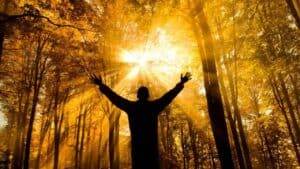
So you’ll have this clergy, this example, because everyone needs a good example in their life, which will be the route forward. So, Abraham gave birth to Isaac and Jacob. 12 Tribes. They go into Egypt. Egyptians were enslaved for several 100 years. Then they come out as a nation, the Jewish nation, the Jewish people, are created after leaving Egypt, after suffering in the crucible of Egypt for several 100 years, they are emerging as a unique entity, the Jewish nation, the Jewish people.
And 50 days later, they stand at the foot of Mount Sinai all together and receive the law of instructions that God will bestow upon them to become this nation of priests, the holy nation, the clergy for the world at large. That was the goal, and that’s the goal that we aspire to in the Jewish community: to live an upright, moral life and incorporate some of the spiritual and ritualistic things that bring spirituality to even some mundane aspects of life.
And that’s supposed to be a good example, a light to the nations, as Isaiah calls it, that motivates and inspires the nations of the world, everybody to collectively look towards God. The commandments given at Sinai are the entirety of the Torah, all the instructions, and all 613 commandments, but those are summarized in the etched stones of the 10 Commandments. And so yes, there are commandments that do not talk specifically about morality, like observing the Sabbath. You can be moral, upright, and not keep the Sabbath.
The goal we aspire to in the Jewish community is to live an upright, moral life and incorporate spiritual and ritualistic practices that bring spirituality to even the most mundane aspects of life.
Those commandments that are outside of the scope of morality, that are beyond civilization building and creating a vessel in this world for God, those are relegated just to the Jewish community. Since it was just the Jewish community, the Jewish nation, that was standing at Sinai, they were the only ones obligated to keep it. Someone living in China can’t be obligated to follow a law they know nothing about and don’t accept. “I didn’t agree to this. I didn’t sign on to this.”
The Jews signed on to it. They stood before Mount Sinai. They were given the instruction, and they’re the ones who maintain this obligation. The rest of humanity is still under the obligation solely of the Noahide code, making a moral society that is based on revealing God, living a godly life in this world.
So the souls that received through Moses, the Torah, and those 10 Commandments, when God spoke the first commandment, all these souls couldn’t handle the energy of that, and then they just all died. Their souls left their bodies, and I guess the angels were sent to put the souls back in the bodies, so that all the Jewish people wouldn’t just be dead.
There are hints in the Torah and the Bible about some of these things, but a lot of them are not in there at all. And yet it’s common knowledge for every Jew to know these things. Is that because it was in the oral Torah that was given at the same time that it was commanded not to be written down, that only the written Torah was to be written down? Could you expound on that?
Sure, these are great questions. I think that your audience may never have had exposure to. All of the written laws in the Torah were accompanied by oral explanation, and there are a lot of commandments that are completely understandable as far as what you’re supposed to do without the oral accompaniment. The sabbath is a perfect example, because the Torah tells us that you have to keep the sabbath. It’s one of the 10 Commandments.
What repentance does is transcend the matrix of reality. When you connect with God, who is beyond time and space, that negativity never happened. Share on XAnd it also says that the penalty for not keeping the sabbath back in those days was if you willingly, purposefully, violated the sabbath, it could be the death penalty, assuming it was malicious and you had witnesses. But the Torah doesn’t explain much about what’s considered working on the sabbath, like it’s such a severe penalty, but it does not specify how one works. Does work mean like plowing your field? Does it mean walking 20 miles, or is it walking two miles?
If you like walking, what are the specifications of what’s considered work? And we’ve talked a lot about these over time, but once you understand the creative labor aspect and the labor categories, it begins to make a lot more sense. Okay, this would be something that would be violating that, and why, and kind of tracing it, but you need an oral law to set out what parameters are exactly in the observance of the sabbath.
And really, all of the commandments fall in that same category. Jewish people notoriously have the mezuzah affixed to their doors as a parchment that goes on the doorposts of their house and upon their gates. Well, what’s supposed to be written in that mezuzah, in that scroll? Who said, where’s it even say the word scroll? It just says, write these words on the doorpost of your house and upon your gates. How is that meant to be done? Which words are we talking about? Where do you place it?
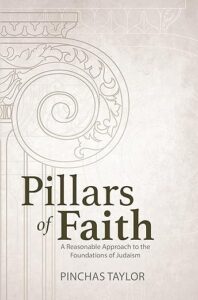
All of the details that go into that are from the oral tradition. And so, without the oral tradition, it’s very difficult, if not impossible, to fulfill any of the commandments, because the parameters, the specifications of fulfillment versus non fulfillment, can sometimes be a very fine line. You’ve got to know, “What do I need to do to fulfill this thing, to forge that connection with God?”
And so what happened at Mount Sinai, not only in the legal sense of finding out the parameters of all the laws, but all of the ways and methodologies of extrapolating from the written text, “What was going on? What’s the greater part of the story? Those lessons and abilities to derive from the Torah were also given at Mount Sinai. And so things like where you have two words found in different verses.
Well, you can learn something sometimes because the same word is used over here, and it’s used over there. And so the parameters used over here also apply over there, because that same word is used. The written Torah is very specific in the wording that it uses as well. So if it uses a less common word versus a more common way of saying the same thing, there’s something that that word is teaching, that extra letter, that larger-than-usual letter, or that smaller-than-usual letter.
There’s always something being taught in the precision of the wording of the Torah. The written Torah is kind of like a computer code. It’s like a graphic user interface for reality. And so what was taking place at Mount Sinai that you alluded to is derived from the oral tradition, from the wording used in those passages that describe the giving of the Torah.
Our tradition teaches that things that were normally heard were seen, and things that were normally seen were heard, like the entire physical reality in that locale was completely overturned, completely upside down, and God starts giving the instructions. And the voice, if you will, of God is so powerful and overpowering that their souls were so elated that they just jumped out of their bodies. It wasn’t out of pain, it was out of joy.
The written Torah is akin to a computer code. It’s like a graphic user interface for reality.
It was like the soul connecting to its source, its maker, jumps right into it. So there had to be some, essentially a miracle, to maintain the souls and put the souls back in the bodies, and then Moses winds up giving the remainder of the commandments after the first two. So these are wild ideas and accountings that apply not only to when the Torah was given but also all of the stories of the Bible to give us a bigger framework as to what was going on in each of these situations.
Questions as simple as if the Bible says that Adam and Eve had two children, Cain and Abel, then where’d the rest of humanity come from? Things as mundane as, “Yeah, where did they come from?” Well, the oral tradition says that each of them was born with a twin sister, and they sort of married the sister from the other that was permitted in the original generation, just to get the population going.
And so if you just read the text of the written Bible, I don’t know that, but there’s an oral tradition accompanying what’s going on in each story, each segment, so not only for the legal stuff, but also for just the happenings that are described in the Torah.
Yeah, and the spiritual meanings and the secrets embedded in the use of certain words in what’s called the gematria. The numbers associated with each letter, when you add them up, equal a number that has spiritual significance, and there are coded messages in that too, even where the dots are placed in the words. It’s all quite astounding. I recently learned about gematria, the numbers of the names of Jacob and Esau, and how there’s the tetragrammaton, the four-letter name of God, embedded essentially seven times in Jacob’s name, eight times in Isaac’s name.
And because there’s eight times the gematria number of the tetragrammaton for letter name of God, equals exactly Isaac’s name, and then it equals seven times the tetragrammaton in Jacob’s name, and there’s one occurrence in Esau name, and then seven occurrences of the word, what is a tuma, which the impurity. So there’s seven times impurity, one time of the four-letter name of God in Esau.
So he wasn’t pure evil, and Jacob went to make peace with this guy who was this mortal enemy that was coming with 400 men to kill him, instead of him preparing for war, and he would have won, and he would have slaughtered his brother, Esau. He humbled himself, made peace with the guy, and essentially bribed him. And all these things. I learned all this stuff just recently.
All these secrets come from the gematria of the names, and it makes so much more sense why he would bow down to his evil brother. Instead of just wiping the guy off the face of the earth, he was restoring some lost part of himself. There were seven mentions of my brother Esau, and then there’s one mention at the end, where it’s the eighth time, and he just mentions, “Could have just called him my brother.”
Esau disappeared, and it’s just now that all these seven levels of impurity have been removed, and now what’s left is the purity of the Creator. It’s just like a mind-blowing, amazing.
Totally. I was talking to some seminary girls last week about the Torah and the world in the movie, The Matrix. The more the person learns Torah, the more you kind of realize, sort of the behind the scenes of The Matrix movie, you’re given the choice to choose which pill you want to take. Are you happy living sort of in the fake world and just going through the motions of what passes through the superficial veneer of what reality seems to be? Or do you want to really see what reality is going on?
And it’s different from the matrix, in the sense that the real reality isn’t gruesome and terrible, it’s actually what the Torah is describing, which is what’s going on in the spiritual world, what these spiritual paradigms are that are taking place as represented in these stories? So, on the one hand, these things take place in the physical world. Adam and Eve really did exist. The Garden of Eden was a physical place.
All of these things happened, as the Torah says they did in time and space, but they also unfolded spiritual paradigms that we can gain access to through Jewish mysticism. It’s a fascinating thing to say. This is not just a story of two brothers who had some fights their whole lives, and there was a big struggle.
These are like worlds colliding and rectifying each other and perfecting and going into the whole rectification of the world as exemplified and personified by these key figures. So it just completely reshapes the way that we live our lives when we delve into it, this sort of way, looking at it, with this sort of lens.
And the term tikkun olam, a very popular, well-known Hebrew expression, means the rectification or healing of the world, and that’s all our job to do, regardless of whether someone is Jewish or not. Jacob is a prime example of somebody who took that very seriously. He could have obliterated his evil brother, and it was totally justified, and it would have rid the world of this darkness and this hatred for no reason.
But then the little spark of purity within Esau would be lost, too, and that could have been reclaimed and restored. That Tikkun Olam, that rectification of the world, would have been an incredible missed opportunity. It was really cool stuff. And when you mentioned The Matrix, just thinking about that green code going across the screen, like dripping off the screen, and it was Japanese kanji, but in reality, it’s Hebrew letters, right? Those are the energy packets of creation. You want to say anything further about that?
Hebrew letters are said to have been spoken into existence by God at the beginning of creation.
Jewish mysticism describes the creation and sustaining of the world similarly to how we sort of think about it scientifically. So you have a hundred-plus elements. That is the fabric of reality, if you will, that these elements, these atoms, combine to form molecules, and ultimately, different substances and physical entities are all created and based on these essential elements. In a similar way, Jewish mysticism describes that the Hebrew letters are spoken into existence by God at the beginning of creation.
In these 10 utterances, in the beginning of the book of Genesis, when God says, “Let there be light,” and God says, “Let there be sun, moon and stars,” and goes through the entire first week in the scope of 10 utterances that the letters themselves are sort of like the periodic table of elements, the spiritual periodic table, and they combine to form different words, which creates the spiritual essence of everything in physical reality.
And so when these letters form the word rock, those three Hebrew letters are the spiritual essence of this thing that takes on the physical nature of Iraq and chair and wall and river and mountain. Every word is essentially a combination of these Hebrew letters that God brings into existence. But it is interesting enough to take it to the next step. The way that we make things and create things is if I build a battleship or something out of Legos with my son, and once we’re finished with it, that’s it. I don’t have to maintain its existence until somebody steps on it. It’s going to retain its existence.
When it comes to the creation process, our mystical stages inform us that all of reality is not only created by God but is constantly sustaining itself at every moment. It’s like a movie projector. You need that constant light hitting the film that projects this image on a screen. And if that light were out for one second, the whole thing just sort of disappears and goes back to nothingness.
So, at 60 frames a second, God is making sure that every frame is showing up because he took his attention away from it, or his intention was no longer to maintain it, then all of reality would shatter instantly.
The nature of nothingness is to remain nothing unless there’s an active force making it somethingness.
It’s an absolutely fascinating thing to think about. The nature of nothingness is to remain nothing unless there’s an active force making it somethingness. And so the divine creation, which is something from nothing, is very different than our creation, which is something from something. And so that’s why there’s this constant need for this investment of godly energy into the creation process.
So aside from being something mystical and fascinating, it has a lot of practical relevance to our lives. Because if everything that happens is divinely orchestrated, if God is sustaining the world, then I can feel a certain sense of security that even if things don’t appear to be going the way that I hoped or thought that they were going in my life, I know that God is very much in control. That doesn’t just leave the world to its own devices to run on autopilot. God is constantly investing God’s energy into the reality we see before us.
Yeah, so that means in every circumstance that might be seen as just an unfortunate, random act of violence or tragedy, something seemingly horribly wrong, or something just chaotic and random. It’s not random. It’s not left to its own devices.
Everything has the hand of God in it, and because the creator is kind, beneficent, and loving and always wants to do good to us, there must be a blessing in whatever storm we are seemingly suffering from at the moment. You want to expound on that?
Well, that’s certainly the case. We don’t often; sometimes we may never see how that plays itself out. Sometimes we get a little bit of an understanding in hindsight, where we’ll be going through something in our own lives that seems like it’s going to be the end of us. It seems like the worst thing in the here and the now, then 10, 20 years later, you look back and say, “Wow, if not for that moment, I wouldn’t be at this great status that I am today.”
It had that thing that I thought was, again, the end of the world at that time, had that not happened to me, and had that situation not come, and so sometimes we do, we are privy to understanding a little bit of God’s ways in hindsight.
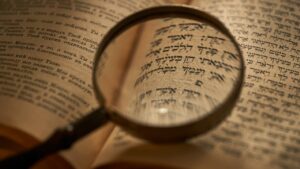
I remember, by the way, my chiropractor, who actually has been a student of Kabbalah for many, many years, for decades, he got close to death in the 2007 2008 time frame, he was very close to not making it through, and told me that he wouldn’t change a thing.
He wouldn’t change anything if he had to choose between that and some other version of reality because it made him better. It brought him closer to the Creator. It made his life much more meaningful, even though it was horrific to go through at the time. That’s amazing. He has that bigger picture view perspective on things.
Absolutely. Those are the people who are often the most inspiring, as though they are the ones who are completely in the zone, despite all the challenges that are going on with them. There’s an analogy that I like to think about when just thinking about why bad things happen to good people, which, again, on an emotional level, we can never understand. It doesn’t seem that way, and we’re not trying to whitewash people’s pain. That’s not the goal over here.
But from a strictly philosophical standpoint, we can kind of wrap our heads around a little bit to understand how God works. In that sense, I vividly remember my great-grandmother’s home. She passed away when I was about 13. I remember going to visit her as a child. And in the entrance to her little condo, she had this—they used to be popular, not so popular anymore—like a needlepoint work, where there was this picture of mountains and a river and trees, but it was all made through needle stitching.
Everything that happens is divinely orchestrated. God is sustaining the world, so you can feel a sense of security even if things don't appear to be going as you hoped. Share on XThis is a beautiful picture, and if you were to take that picture off the wall and look at the back, it’s complete chaos. From the back, it made no sense. It looked like nothing. It just zigzags; it looked ugly, it looked disgusting, nothing you would want to hang on your wall, but that same exact picture looked at from the front view, looked pristine, looked perfect, everything symmetrical and exactly as it needed to be.
We human beings in the physical world see things through the back of the picture, where everything looks chaotic, discombobulated, and zigzag. Nothing makes sense; there is no cause or effect. Everything’s just all over the place. And when you look at that same thing from the front view, which we will be privy to, just maybe not in our physical lives and our physical selves, when we look at the picture through that lens, through the front of it, from God’s lens, it’s like everything is exactly as it needs to be.
Even small things that seem to go awry, like glitches and the internet connection when you’re trying to do a podcast interview, or technical difficulties before the call starts, or the hard drive crashes, these glitches that you get with, like we’re having glitches right now, they can be explained away spiritually with, let’s say Mercury is in retrograde, which it is right now. And that’s true.
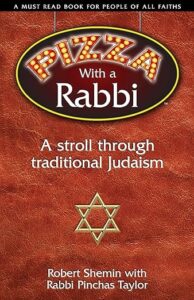
Things go haywire. Technology and communication go off the rails during Mercury in retrograde. But there’s a higher level truth that God runs everything, so you have this natural law of, “Hey, Mercury is in retrograde. Prepare for a lot of chaos.” Still, you’ve got this higher level: “God has everything under control, and everything has a purpose and a reason.”
And so when all this stuff was going wrong with computer technology and stuff, our interview ended up starting a half hour later, because my wife’s interview started a half hour later, and they were back to back. It was all like glitch after glitch after glitch for half an hour before Orion’s podcast interview. So, it seems like there’s a lesson here that I was meant to get, and then I start meditating on that like, “Oh, this is something I meant to bring up in this interview.”
This mercury retrograde is a thing, sure, but you need to operate more from this higher spiritual principle, which in Judaism is referred to as the ‘Tree of Life,’ whereas the ‘Tree of Knowledge’ has a lot of true stuff in it in terms of how the world works, the good and the bad, the duality, light and dark, and all that.
But there’s this higher principle called the tree of life, where everything is a miracle, and rather than trying to predict the future through divination, through tarot cards and astrology and reading your horoscope and paying attention to whether what planet is in retrograde or not, and then making your decisions based on that, then you can disconnect from that reality and connect to the ‘Tree of Life’ reality that everything is a miracle, and your life is so much richer and miraculous. Can you expound a bit more on that?
Absolutely. So getting back to our matrix analogy, I think it would be a good starting point, because this creation, this universe, that God created this physical reality seems infinite in many ways. I mean, 90 billion light years in the observable universe. That number is so unfathomably large, it might as well be infinite. But this reality of existence is something like the rules God set in the program.
If this physical world is a computer program, we must always remember that a computer programmer ultimately controls the program.
So if the matrix is a computer program, and this physical world is a computer program, we always have to remember that a computer programmer is above and in control of the program at the end of the day. So, left to its own devices, the program will work according to how it’s been programmed. When I throw a rock up in the air, it will fall because that’s embedded in the program. That is the way that the rules work.
Could there be a need to suspend the rock in the air, or that the rock turned to fire, or some other sort of outside of the matrix or the computer program? Well, yeah, we might call that a miracle. That just means it’s not frequent, and the computer programmer interacts in a way they don’t normally interact. What does that mean for us? A lot of people ask me, “Do Jews believe in karma?”
If by the premise of karma you mean that whatever you put out into the universe comes back to you, so if you put good out there, good comes back to you, put bad out there, bad comes back to you, well then, yes. There’s this idea of measure for measure or tit for tat. There’s one caveat to that, though, and this is sort of a limitation of karma, from a strictly karmic thinking and that every action has an equal and opposite reaction, which, by the way, is just a physics model of a spiritual principle that every action has an equal and opposite reaction. It exists in physics.
This spiritual principle of measure for measure exists, just like the lower parallel of that cause and effect. In that model, if all of reality was strictly the matrix or strictly the karmic universe, then if I do something that I’m not supposed to do, sooner or later, that bad stuff is coming back to me. The missing element is that you forget about the computer program, or in the language of Judaism, you forget about the concept of teshuvah, of repentance.
What repentance does is transcend the matrix of reality. It transcends the physical world. We re-establish and reaffirm our connection with God. We never lose our connection with God. But this brings out for ourselves that connection that we had from the get-go, and when I connect with God, who is beyond time and space, well, that negative thing never happened. If I repent to God about something I’ve done in the past, that was the right thing to do.
Whatever you put out into the universe comes back to you.
If I do teshuvah properly, repent properly, and return to God properly, that event will never happen. It’s wiped away. The timeline that comes out of that also never happened, and all the negative results that resulted from that, as ripple effects, never came from that; it never existed. If I go to the programmer who programmed this system, I can override the system. It’s like a miracle. It’s kind of like when you ever have a discrepancy, like you need to change your flight.
You paid this amount for your flight, and you need to change tickets, and you call Jet Blue, or whatever it is, and you ask to speak to a representative, and they say, “Well, there’s going to be this fee, and you can only change this. These are all the rules for changing flights.” So I always say, what does a good Jew always do? “Let me speak to your supervisor.” And we won’t stop at the next supervisor.
You go to the next and go all the way to the airline’s CEO if you have to override. “I know I understand that this is the system. This is our policy. This is our system.” They try to put it into the computer. “It won’t let me do it.” “Well, find me someone who can override it.” So, whether Mercury is retrograde or any other aspect of the universe is set up in a way that is not in our favor, if we connect ourselves with the source of the computer program, we go to the programmer himself, and that system can be overridden.
We shouldn’t confine ourselves to whatever our zodiac is. Whatever my nature or nurture is, God can set an entire new path that wasn’t, perhaps, destined for the person at the get-go, where God can rewrite based on our teshuvah and connecting with him in a whole renewed sort of way. We can renew and restore a whole different destiny than the one we were on until now.
Yeah, and this also relates to timelines and the multiverse and everything because you have all these different realities happening simultaneously, and there’s disclosure from the light and disclosure from the dark about this in mainstream media and the entertainment complex. There are godless movies, Marvel movies, Everything Everywhere All at Once, which are like really dark, horrific movies that don’t have any architect, master of the universe, God component at all.
It’s just to convey, “Yeah, we live in a multiverse.” Or to convey, “Yes, there are many, many timelines to choose from.” But, “Hey, who’s the programmer here? There is a programmer. Go straight to the program, or don’t deal with intermediaries, don’t try and divinate or talk to the dead to try and figure out how to sidestep some issues or whatever. Go straight to the top.”
I love that teshuvah actually. The Hebrew word means ‘return.’ It’s talked about as repentance in popular culture, but it’s actually return, because we’re going back to God, which is where we came from, and that’s outside of time and space, and that rewrites all the timeline and everything you’re on. And it’s just incredible. It’s amazing.
100%.
Let’s talk for a minute about necromancy, talking to the dead. I’ve had psychic mediums on this show, which, by definition, talk to the dead. Some psychics have psychic abilities that are not related to mediumship. There’s divination, there’s tarot cards, there’s astrology, and there’s all sorts of stuff that are in my understanding, as I go deeper into Judaism, it’s forbidden. Actually, it’s also forbidden out of the seven Noahide laws, right?
Yeah, these sorts of activities definitely need to be avoided. There are really two reasons, one of which is deeper than the other. So the basic reason is that, especially nowadays, the vast majority of these sorts of people are actually charlatans. Statistically speaking, if I were walking down one major street in South Florida with 50 psychic fair palm reading stores available, it can be assumed that most, if not all of them, are just charlatans.
God brings us into this world to have free will and make decisions based on it.
But even if we knew 100% that this person was legit and they really could speak to the dead, or they really could lay out their tarot cards and let you know what’s going to happen next week, next month, next year, it’s something that needs to be avoided, and is commanded in the Torah to avoid it, based on a verse that says in Hebrew “Tamim Tihyeh”, you shall be pure and earnest with the Lord your God.
That means that these tools will ultimately eradicate our free will, which is the whole point that God brings us to this world, to have free will and make decisions based on free will, or, more importantly, they drop God from the picture. They wind up dropping God from the picture. For example, if I apply for a job, they get back to me and say, “We’ll let you know next week whether or not you got this job that you applied for.”
So rather than pray to God, I decide I’m going to go to my local tarot card reader and they’re going to look, “Next week, am I going to get the job or not?” Well, if they tell me that I will get the job, I’m not going to bother praying to God for it, because I already know that I’m getting it. If they tell me I’m not going to get the job, I’m going to say, “Well, I’m not going to waste my time praying to God because I know I’m not going to get it.” And so what inevitably happens is that God is dropped from the picture.
God is meant to be the source of everything. The preservation of free will is also an issue. If I have indisputable proof that there’s an afterlife or that there’s something higher that comes from a place that is elsewhere besides faith or faith based on reason, but faith nonetheless, if I have absolute proof, well, I’m not really in the realm of free will anymore.
You are a human being created in the image of God. You have a purpose in this world that was crafted specifically for you.
How could I do the wrong thing now, because I know 100% certainty that there is something more to this, and the whole purpose is to be in this free willed environment and to utilize the five senses that we’ve been given to sort of process reality, to use explicitly those five senses to interact with the reality that we have and make the right decisions based on those things.
So again, the eradication of free will and the dropping of God from the picture becomes problematic for these particular matters. So even if, which would be rare anyway, but even if you knew that this person was 100% legit, that’s why it would be forbidden, still to go, according to the Torah, to these types of people.
An analogy that comes to mind is reading the Wikipedia page of a movie before you see the movie. You’ve just ruined the movie.
That’s right.
Don’t play with that stuff. Go direct to God with your questions, problems, feelings of loss and lack, chaos, and all that sort of stuff. Don’t work through an intermediary, because that’s a false god. Whoever you’ve elevated to that status is your go-to, instead of the master of the universe. That’s idolatry. That’s very dangerous. This is a very spiritual, awakened time for humanity, where many people are starting to see the glitches in the matrix. They’re getting very excited about it.
It’s very tempting to see psychics and go to witchcraft stores or whatever, and get tarot decks and all these sorts of things. It’s very dangerous.
It certainly is.
I know we’re at a time here. So if we can leave our listener or viewer with one last quick nugget of wisdom and then your contact details if they wanted to sign up for your Ark program to learn more Jewish wisdom that’s made accessible to non-Jewish, that would be amazing. Thank you for making that your mission in the world. Where do they go for that? But first, the wisdom nugget.
So somebody asked me a few years ago, if I had the entire world standing in front of me and I could deliver one message, what do I think is the most important message that needs to be heard by humanity, and it’s just one line? You are a human being created in the image of God.
You have a purpose in this world that was crafted specifically for you. The rest is commentary, as they say, that’s getting back to that initial soul root who we are, that we are creations of God. We are godliness, which is spending some time in a physical world that has a distinct purpose in its place and its circle of influence to correct, rectify, and perfect us.
God is meant to be the source of everything.
Only we could do that, not anyone else who has ever lived, not everyone else living today, anywhere or ever lived or ever will live, can correct that piece of the puzzle. So we have a very big and important mission in this world, and it behooves us to get more in sync with what that is, and discover where we fit in that divine plan.
Well said. Where do we send our listener or viewer to learn more from you?
If a person is of the Jewish faith or not of the Jewish faith and wants to learn the spiritual wisdom of the Torah, you can go to the Ark program, arkprogram.org.
Awesome. Well, thank you, Rabbi Pinchas, and thank you, listener and viewer, for being open-minded and wanting to be a source of light and inspiration in the world and taking action. Thank you for being part of the tribe. We’ll catch you in the next episode. In the meantime, have a fantastic week. I’m your host. Stephan Spencer, signing off.
Important Links
Connect with Rabbi Pinchas Taylor
Books
People
Film


